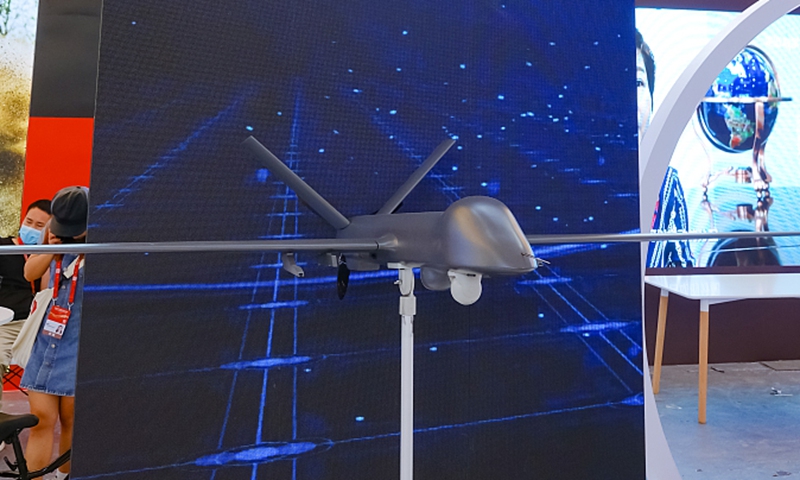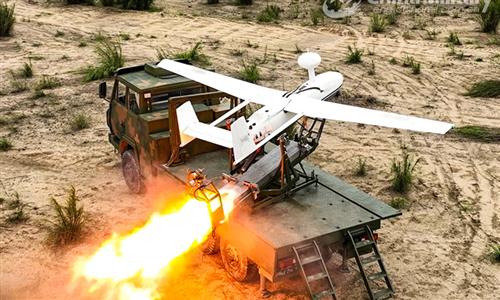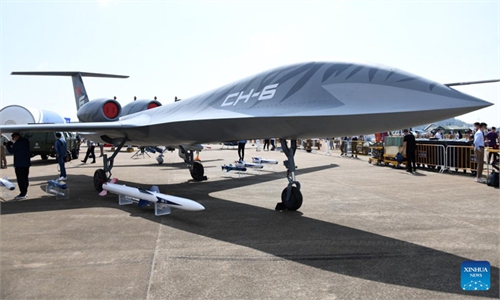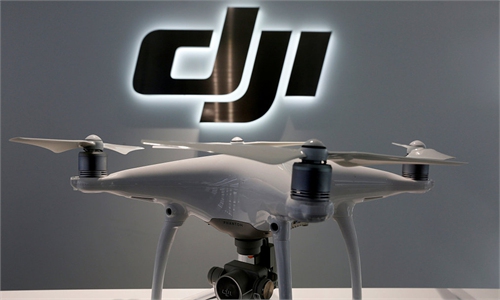
Rainbow UAV is on display during the China Brand Day event on May 9, 2021 in Shanghai. Photo: CFP
Four departments of China's central authorities on Monday jointly announced export controls on some Unmanned Aerial Vehicles (UAVs) and related equipment. A spokesperson for the Ministry of Commerce said that China has always been committed to maintaining global security and regional stability, and has always opposed the use of civilian UAVs for military purposes.
High-performance drones have certain military attributes, and it is an international practice to impose export controls on these products, the spokesperson said.
China's latest UAVs export controls come after a period of careful decision-making. At present, the use of drones in military conflict has become a major focus of attention of the international community. China's move has important exemplary significance and fully demonstrates China's firm determination and responsibility to prevent weapons proliferation, promote regional stability, and maintain world peace.
As some regional conflicts are continuing and intensifying, and the use of drones has also brought certain changes to the conflicts, some countries continue to provide such weapons to the involving parties of the conflicts. For example, under the Trump administration, the US loosened controls on exports of military drones in 2020 to increase trade opportunities for US companies. Such irresponsible moves to fuel the conflict should be condemned by the international community.
China's stance contrasts sharply with that of the US. As a responsible major country, China has continued to strengthen its drone export control policy in accordance to changes in international situation.
As early as 2002, China implemented the Regulations on Export Control of Missiles and Related Items and Technologies and other regulations to control the export of UAVs. In 2015, China implemented export controls on three types of items, including UAVs with a shooting or flying range of not less than 300 kilometers. In 2020, China included some UAVs technologies in the China's Catalogue of Technologies Prohibited or Restricted from Export.
Previously, Chinese drone companies have stated that they will stop selling drones to conflict areas. Now, the Chinese government has adjusted its policy again, explicitly implementing export controls on two types of drone-related items. Aiming to maintain global peace and stability, China's newly implemented drone export control measures have precisely supervised the types of drones that may be used for military purposes.
First, it is an aero-engine specially used for UAVs that reaches a certain performance index, an important load specially used for unmanned aerial vehicles, radio communication equipment specially used for UAVs and reaching a certain performance index, and civil anti-drone systems. These items will be officially included in the control list.
Another aspect is to restrict the export of other drones based on use scenario. The policy change requires that other drones not covered by regulation cannot be used in weapons of mass destruction programs or exported for military purposes or terrorism.
It should be pointed out that the latest export controls do not mean prohibiting exports. The ministry spokesperson said that China firmly supports Chinese companies in conducting international trade and cooperation in drones for civilian use.
As long as the exporting items are used for legal civil purposes, they can be exported normally after performing relevant procedures. This is in line with China's original intention to promote peaceful cooperation in the security field and oppose "decoupling and breaking industrial chains" pushed by the US.
The author is director of Center for Arms Control Studies, China Institutes of Contemporary International Relations in Beijing. bizopinion@globaltimes.com.cn



